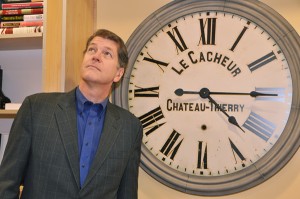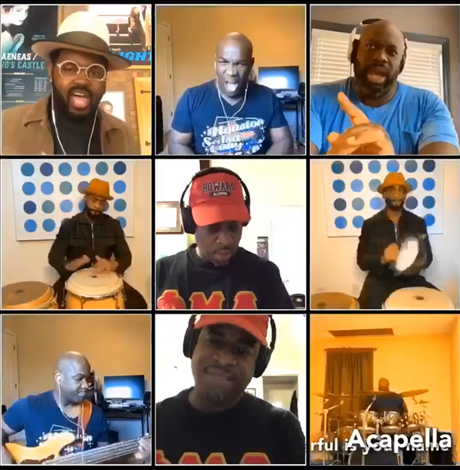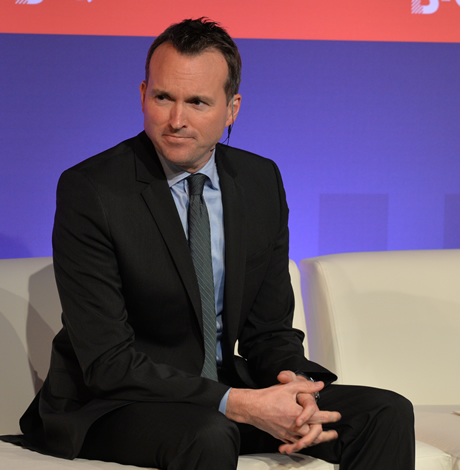Living
Queery: Steve Clemons
The think tank guru and blogger answers 20 gay questions
Steve Clemons reads a lot. He’s never fully caught up on the thousands of e-mails he gets daily and he’s inundated with what he calls a “gusher” of information. But it’s part of what gives his blog, the Washington Note, its sharp edge and keeps him in demand as a commentator on cable news.
“It’s constant and I do a pretty good job of keeping up with it, absorbing information quickly,” he says. “So the chances are high that I will know an angle or a twist to ask about. You gotta be informed — that’s a big part of it. If not, you’ll be derivative.”
Clemons started his blog with his friend Josh Marshall in 2004 as an outlet for his dual passion of foreign policy and economic “stuff,” that he wasn’t doing much with at his day job as a senior fellow at the American Strategy Program at the New America Foundation, a centrist think tank he co-founded 12 years ago. He got on the national radar quickly and was named a blog favorite this year by Time magazine. A well-timed scoop in 2006 about former United Nations Ambassador John Bolton and a cancelled hearing earned him more than 6 million hits in a single day.
Clemons, a 48-year-old Bartlesville, Okla., native, has been in Washington 16 years. Before that, he spent 14 years in Los Angeles where he directed the Japan America Society of Southern California.
His philosophy on being openly gay is, “I don’t shy away from it, but I don’t wear it on my sleeve either.”
He and his partner, Andrew Oros, have been together 19 years and live in Dupont Circle with their dog, Oakley, a Weimaraner.
Clemons enjoys blogging, running, biking, fishing, reading and selling small items on eBay in his spare time. (Blade photos by Michael Key)
How long have you been out and who was the hardest person to tell?
Since 1992. One of my mentors, Chalmers Johnson, was tough for me but went well. Also my husband’s mom, whose sister was spreading rumors that I was having an affair with Andrew’s mom. Untrue of course — the affair was with her son.
Who’s your gay hero?
Alexander the Great, Leonardo Da Vinci, Michelangelo, John Maynard Keynes, Frank Kameny, Pedro Zamora, Andrew Tobias
What is Washington’s best nightspot, past or present?
Nellie’s (Cobalt is close second).
Describe your dream gay wedding.
Had it — eloped and got married on the steps of San Francisco City Hall with a couple of other gay couples in August 2008 and on-looking tourists applauding like crazy when my husband and I kissed. In 1996 had an LTC-BBQ (long-term commitment barbecue at my father-in-law’s. Also very cool.)
What non-gay issue are you most passionate about?
Improving the direction of U.S. foreign policy — getting Israel/Palestine resolved, ending the Afghanistan war, getting Iran on a non-nuclear course, normalizing relations with Cuba, etc.
What historical outcome would you change?
I would have preferred Monica Lewinsky to have an affair with Bill Clinton after he was president rather than during his time in office. We might then have gotten Israel/Palestine two-state solution in place and have resolved the North Korea nuclear mess early. This in turn might have helped Al Gore get elected over Bush, preempted the invasion of Iraq and probably wouldn’t have had the same Iran challenge we have today.
What’s been the most memorable pop culture moment of your lifetime?
I went as “media” to the HRC dinner featuring President Obama. During “media availability” I met the cast of “Glee” as well as Lady Gaga while waiting to meet Matthew Shepard’s parents. I didn’t know who “Glee” and Lady Gaga were (though in retrospect I had heard Gaga’s music — just didn’t know the name of the singer) and only recognized Jane Lynch from “Julie and Julia.” Now I love Gaga and “Glee” obsessively. Other cool thing is that Darren Star, creater of “Beverly Hills 90210,” “Melrose Place,” and “Sex in the City,” was my best friend in college. Took Darren to the White House Correspondents dinner this year and sat him next to Zbigniew Brzezinski, Brent Scowcroft, Denis McDonough and Joshua Marshall. It was really hot when Bradley Cooper, Cynthia Nixon and other Darren discoveries came over to schmooze our table.
On what do you insist?
Active engagement in life and causes. No time for those who wait passively for things to happen.
What was your last Facebook post or Tweet?
@SCClemons — Obama will score very, very big points across the board if DADT passes the Senate tomorrow. This is a big deal. There will be great fanfare and celebration or lots of tears tomorrow.
If your life were a book, what would the title be?
“America’s Gay Machiavelli”
If science discovered a way to change sexual orientation, what would you do?
Stay exactly as I am.
What do you believe in beyond the physical world?
Energy
What’s your advice for LGBT movement leaders?
Remember that their job is to eventually put the LGBT business out of business, not become too comfortable with the status quo struggles. We want equality, fairness, an end to discrimination — and we need to keep the pressure up all the time to move our rights forward.
What would you walk across hot coals for?
An end to “Don’t Ask, Don’t Tell” (ouch, those are hot!), gay marriage in America, saving anyone in Matthew Shepard’s shoes, my friends in need, my husband.
What gay stereotype annoys you most?
The notion that gay men are pedophiles or that effeminacy and being gay are in lockstep.
What’s your favorite gay movie?
“Longtime Companion” (“Another Country” comes in close second)
What’s the most overrated social custom?
Wearing ties — can we just get rid of them all?
What trophy or prize do you most covet?
Any national bass fishing trophy — and maybe a Pulitzer for blogging.
What do you wish you’d known at 18?
That it was really, really all going to be OK.
Why Washington?
Because Washington is the sun around which politicos here and around the world orbit. D.C. is a free trade zone for pursuing any cause — and to get a better world, whether through ending LGBT discrimination or improving America’s foreign policy course, one has to compete effectively in the game here.
Real Estate
Celebrate the power of homeownership this Fourth of July
Owning a home is powerful act of self-determination

This Fourth of July, celebrate more than independence: celebrate the power of LGBTQ+ homeownership. Explore resources, rights, and representation with GayRealEstate.com, the trusted leader in LGBTQ+ real estate for over 30 years.
Home is more than a house: it’s a symbol of freedom
As the fireworks light up the sky this Fourth of July, LGBTQ+ individuals and families across the country are not just celebrating the nation’s independence — they’re celebrating personal milestones of freedom, visibility, and the right to call a place their own.
For many in the LGBTQ+ community, owning a home represents more than stability — it’s a powerful act of self-determination. After generations of discrimination and exclusion from housing opportunities, more LGBTQ+ people are stepping into homeownership with pride and purpose.
Why homeownership matters to the LGBTQ+ community
While progress has been made, LGBTQ+ homebuyers still face unique challenges, including:
- Housing discrimination, even in states with legal protections
- Limited access to LGBTQ+ friendly realtors and resources
- Concerns about safety and acceptance in new neighborhoods
- Lack of representation in the real estate industry
That’s why the Fourth of July is a perfect time to reflect not just on freedom as a concept, but on how that freedom is expressed in the real world — through ownership, safety, and pride in where and how we live.
Finding LGBTQ+ Friendly Neighborhoods
One of the top concerns for LGBTQ+ buyers is whether they’ll feel safe, accepted, and welcome in their new neighborhood. Thanks to evolving attitudes and stronger community support, many cities across the U.S. now offer inclusive, affirming environments.
Some of the best cities for LGBTQ+ home buyers include:
- Wilton Manors, Fla. – A vibrant LGBTQ+ hub with strong community ties
- Palm Springs, Calif. – A longtime favorite for LGBTQ+ homeowners
- Asheville, N.C. – Progressive and artsy, with growing LGBTQ+ visibility
- Portland, Ore. – Inclusive, eco-conscious, and diverse
- Philadelphia, PA – Rich in history and LGBTQ+ community leadership
When you work with an LGBTQ+ friendly realtor, you get insight into more than property values — you get a real perspective on where you’ll feel most at home.
Navigating the real estate process with confidence
Whether you’re a first-time gay homebuyer or preparing to sell your home as an LGBTQ+ couple, it’s essential to understand your rights and options. Here are a few key tips:
1. Work with a trusted LGBTQ+ real estate agent
Representation matters. A gay realtor, lesbian real estate agent, or LGBTQ+ friendly agent understands the unique concerns you may face and advocates for you every step of the way.
Use GayRealEstate.com to connect with LGBTQ+ real estate agents near you. For over 30 years, we’ve helped LGBTQ+ buyers and sellers find their ideal home and a professional who respects their identity.
2. Know your legal protections
While federal law (via the Fair Housing Act and Supreme Court rulings) prohibits housing discrimination based on sexual orientation or gender identity, enforcement can vary by state. Make sure to research:
- State-level housing discrimination laws
- Local LGBTQ+ protections and resources
- What to do if you experience discrimination during a transaction
3. Secure inclusive financing
While most lenders follow fair lending rules, it’s smart to seek out banks or credit unions with LGBTQ+ inclusive policies and a history of non-discriminatory lending practices.
4. Plan for the future as a family
For same-sex couples, especially unmarried partners, it’s vital to review how you’ll hold the title, designate beneficiaries, and plan your estate.
Ask your agent or attorney about:
- Joint tenancy with right of survivorship
- Living trusts
- Powers of attorney and healthcare proxies
Selling a home as an LGBTQ+ homeowner
If you’re listing your home, working with a gay-friendly real estate agent ensures your identity and story are honored — not hidden — in the process.
Highlight:
- Your community connections
- Your home’s role in creating a safe space
- Local LGBTQ+ resources to attract like-minded buyers
Showcasing the full value of your home includes sharing what it meant to live there authentically and safely.
Your home, your freedom
The Fourth of July reminds us that freedom isn’t just an abstract idea — it’s lived every day in the spaces where we find comfort, love, and belonging. For the LGBTQ+ community, the right to own and thrive in a home is part of the larger journey toward full equality.
At GayRealEstate.com, we believe every LGBTQ+ person deserves:
- A safe place to live
- A community that welcomes them
- An advocate in the home buying or selling process
Ready to make a move?
Whether you’re dreaming of your first home, upgrading with your partner, or selling a space that helped shape your identity, GayRealEstate.com is your trusted partner. With our nationwide network of gay realtors, lesbian real estate agents, and LGBTQ+ friendly professionals, we make your journey smooth, respectful, and informed.
Visit GayRealEstate.com to:
- Search LGBTQ+ friendly homes
- Connect with inclusive real estate agents
- Access free guides for buyers and sellers
- Protect your rights and get expert advice
This Fourth of July, celebrate more than independence — celebrate your freedom to live, love, and own with pride.

Did you melt like the Wicked Witch of the West this week?
As summer temperatures rise, keeping your home or apartment cool during a heat wave can become both a comfort issue and a financial challenge. One of the most effective ways to keep a home cool is to prevent heat from entering in the first place. Sunlight streaming through windows can significantly raise indoor temperatures. Consider the following solutions:
• Close blinds or curtains during the hottest parts of the day. Blackout curtains or thermal drapes can reduce heat gain by up to 30%.
• Install reflective window films to block UV rays and reduce solar heat without sacrificing natural light.
• Use outdoor shading solutions such as awnings (yes, the ones you removed because they were “dated”) and shutters to limit direct sunlight.
Fans are a cost-effective way to circulate air and create a wind-chill effect that makes rooms feel cooler.
• Ceiling fans should rotate counterclockwise in the summer to push cool air down.
• Box fans or oscillating fans can be placed near windows to pull in cooler evening air or push hot air out.
• Create a cross-breeze by opening windows on opposite sides of your home and positioning fans to direct airflow through the space.
• For an extra cooling effect, place a bowl of ice or a frozen water bottle in front of a fan to circulate chilled air.
To optimize natural ventilation, open windows early in the morning or late in the evening when outdoor temperatures drop. This allows cooler air to flow in and helps ventilate heat that built up during the day.
Appliances and electronics generate a surprising amount of heat. To reduce indoor temperatures:
• Avoid using the oven or stove during the day; opt for no-cook meals, microwave cooking, or grilling outside.
• Run heat-producing appliances like dishwashers and clothes dryers in the early morning or late evening.
• Unplug electronics when not in use, as even standby power can add heat to your space.
• Switching to energy-efficient LED lightbulbs can also reduce ambient heat compared to incandescent lighting.
If you do use an air conditioner, maximize its effectiveness by:
• Setting it to a reasonable temperature—around 76–78°F when you’re home and higher when you’re away.
• Cleaning or replacing filters regularly to maintain airflow and efficiency.
• Sealing gaps around doors and windows to prevent cool air from escaping. (Didn’t we all have a parent who said, “Close the door. You’re letting all the cool out?”)
• Using a programmable thermostat to optimize cooling schedules and reduce energy use.
If it is not cost-prohibitive, adding insulation in attics and walls can greatly reduce heat transfer. Solar panels that reflect heat can also help, as well as offset the cost of their installation. Adding weatherstripping around doors and windows, sealing cracks, and using door sweeps can make a significant difference in keeping heat out and cool air in.
Natural and eco-conscious methods can also help cool your home.
• Snake plants, ferns, or rubber trees can improve air quality and slightly cool the air through transpiration.
• White or reflective roof paint can reduce roof temperatures significantly.
• Cooling mats or bedding can make sleeping more comfortable without cranking up the A/C.
For renters or those who can’t make permanent modifications, there are still plenty of ways to keep cool.
• Use portable fans and A/C units instead of built-in systems, making sure they are the correct size for your space.
• Removable window film or static cling tinting can reflect heat without violating your lease.
• Install tension rod curtains or temporary blackout panels instead of hardware-mounted window coverings.
• Add draft blockers and weatherstripping tape that can be applied and removed without damage.
• Cover floors with light-colored rugs to reflect heat rather than absorb it.
• If allowed, use temporary adhesive hooks to hang reflective materials or light-filtering fabrics over windows.
Even if your space is warm, you can still take steps to help your body stay cool.
• Wear light, breathable fabrics like cotton or linen.
• Stay hydrated and avoid caffeine or alcohol during peak heat hours.
• Take cool showers or use damp cloths on your neck and wrists to bring your body temperature down.
Keeping your home or apartment cool in the summer doesn’t have to be expensive or energy-intensive. With a few adjustments such as blocking sunlight, optimizing airflow, using fans effectively, and making renter-friendly upgrades, you can create a more comfortable indoor environment while keeping energy bills in check.
Valerie M. Blake is a licensed Associate Broker in D.C., Maryland, and Virginia with RLAH @properties. Call or text her at 202-246-8602, email her at DCHomeQuest.com, or follow her on Facebook at TheRealst8ofAffairs.
Real Estate
The world’s on fire and D.C. is on sale (sort of)
Prices are up, but then again, nothing makes sense anymore

ICE is disappearing people, revered government agencies are shuttering, and who knows if we’ll be in World War III next week? But can you believe prices in D.C. are actually still up 6.3% since last year? It doesn’t make sense, and perhaps that does make sense, because nothing seems to make any sense any more.
That said, there are some parts of our market that are truly suffering. The interest rates, which have been up, up, up for about four years now, are the ongoing rain on our market’s military parade. Combine that with 75,000 federal employees taking a buyout nationwide, and DOGE cuts eliminating around 40,000 federal jobs in the District (per estimates by the D.C. CFO), not to mention thousands of other job losses in non-governmental organizations due to funding and program cuts, and you’ve got a case of uncertainty, and downright unaffordability in the pool of otherwise would-be buyers.
This has had a marked impact on properties that starter-home buyers and low- to mid-level employees would otherwise buy, most notably condominium and cooperative apartment units. These properties have already slowed in our market thanks to the profound impact that higher interest rates have had on their monthly carrying costs—pair that with job insecurity, and a lot of condos are proving to be very difficult to sell indeed.
So how is the average sale price up in our market?
The increase is almost entirely due to the resounding strength of the single-family home market, especially in upper Northwest D.C., where it is still quite common to see bidding wars, even on properties pushing past the $3M mark. It seems that buyers in that echelon are less impacted by a few percentage points in the interest rate, and less concerned about their job security. Notably, those buyers are often married with children and have an absolute need for more space, must stay in the area due to one spouse’s job, or the kid’s friend group, regardless of whether the cost of owning is thousands of dollars more per month than it would have been in 2020 or 2021. The continued appreciation in these neighborhoods defies imagination.
So, what to do if you are not one of those lucky enough to be shopping for a $3M home? The short answer: wait. If you want more space, rent your current place out and learn the joys of being a landlord while someone else pays your mortgage. Need the equity from your current home to buy your next place? Get a home equity line of credit, or loan, and pull the equity out of your current place to buy the next one. Or—and I have never recommended this before in 21 years of being a Realtor—rent for a few years. Sure, I’d love to list and sell your condo so you can climb the real estate ladder, but it might just be a waste of time, money or both if you could just ride out this storm and sell in a DOGE-less future.
All this said, there are some condos that seem to be immune from this recent negative news. Anecdotally, it feels like it’s the truly special ones that do just fine no matter the market. Our recent listing in Capitol Hill had a view from every one of its 15 windows of the Supreme Court. Sold in five days with six offers. Another condo was on the top two floors of a townhouse and had the coolest black wood floors that gleamed like a grand piano. Sold in four days at full price.
So, all is not for naught if you have a condo or home in an area that people want to be in, with nice space, light, amenities and a certain je ne sais quois. And, as long as we have a democracy in a few years, my experience says our market will be back, stronger than ever, really soon.
David Bediz is a Realtor and mortgage loan broker for the Bediz Group LLC and Home Starts Here, LLC. Reach him at [email protected].
-

 Virginia2 days ago
Virginia2 days agoDefying trends, new LGBTQ center opens in rural Winchester, Va.
-

 South Africa5 days ago
South Africa5 days agoLesbian feminist becomes South African MP
-

 Travel4 days ago
Travel4 days agoManchester is vibrant tapestry of culture, history, and Pride
-

 Opinions3 days ago
Opinions3 days agoUSAID’s demise: America’s global betrayal of trust with LGBTQ people










